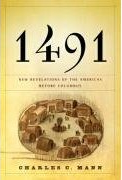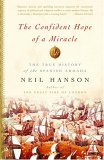
While I was mostly unaware of evidence of these things beyond the Mayan ruins and such, I was particularly interested by the areas Mann points out where the Indians (and he uses this word explicitly) optimized their solutions to problems differently than Europeans or Asians. For instance, rather than domesticate livestock like bison, the Indians in North America simply extended the range of the bison and optimized the forests to allow deer to flourish by regularly setting fires to prairies and the forest undergrowth. At one point, bison ranged as far as Maine and Georgia.
Another example of this difference is the Inka's use of fiber instead of steel or wood for tools. Andean cultures wove reed ships that were easily the size of Spanish caravelles, built rope suspension bridges, and made quilted cloth armor that was almost as strong as European armor at a fraction of the weight (the conquistadors switched from their breastplate and helmets to the Inkan armor.)
A third example I found interesting was the Norte Chico civilization in the Andes. They were unusual in the fact that they developed agriculture not for food like every other civilization in the world, but for cotton. The primary use for this cotton was to make fishing nets to harvest fish. There's almost no evidence of food crops at all.
Like Jared Diamond describes in Collapse and Guns, Germs, and Steel, Mann points to a few factors that brought these great civilizations down. Early contacts (even pre-Plymouth or pre-Cortez) introduced smallpox and other diseases that wiped out huge percentages of the populations. By the time the Pilgrims arrived, scores of Indian villages had already disappeared. In other cases, over-population and bad climactic conditions (usually drought) wiped out civilizations to the point where they were conquered and/or assimilated by their neighbors.
I thought the book was well-written and fascinating. It's great to see more light thrown on these incredible civilizations.
 It's hard to believe that a guy named Serge Melnyk speaks Chinese well enough to teach Chinese, but our man Serge does. In fact, his Chinese is better than his English, which he speaks with a weird accent.
It's hard to believe that a guy named Serge Melnyk speaks Chinese well enough to teach Chinese, but our man Serge does. In fact, his Chinese is better than his English, which he speaks with a weird accent. 

